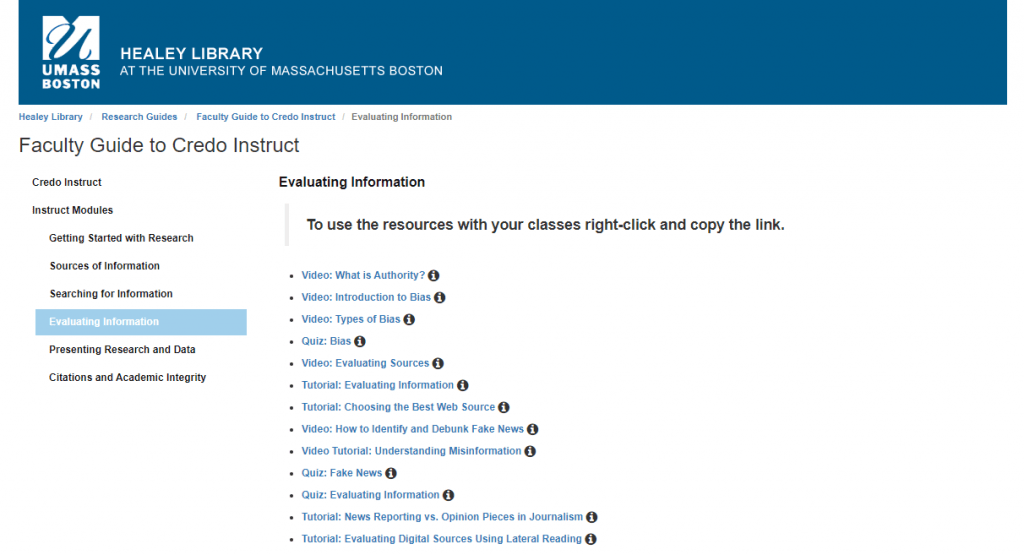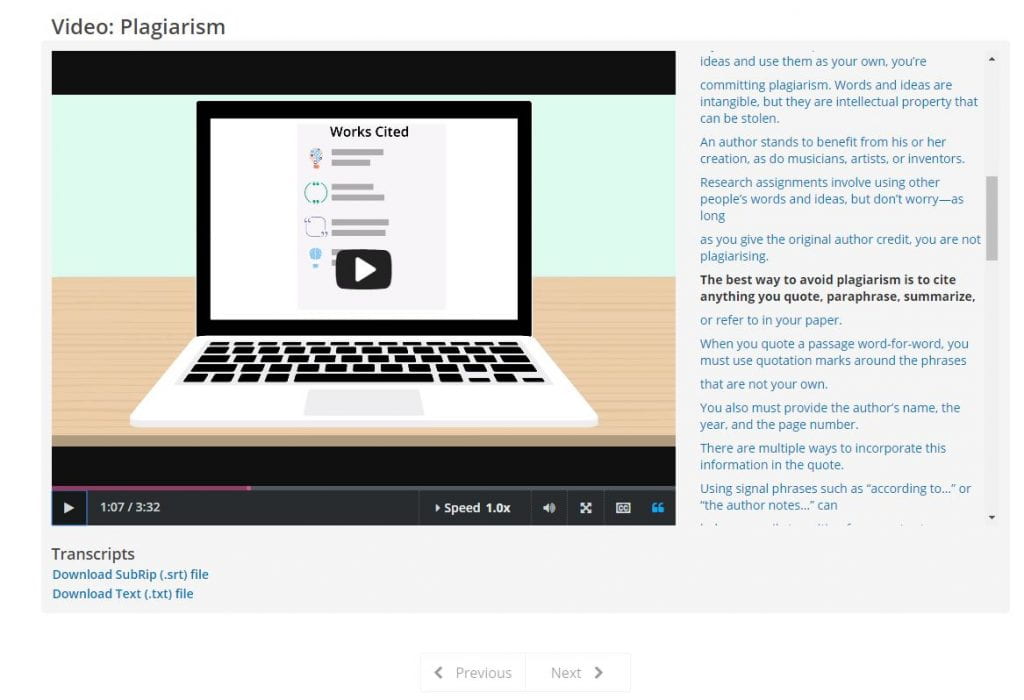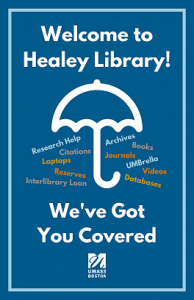We are pleased to share with you the following exciting updates related to Healey Library’s staffing and services. Please let us know how we can support you as we wrap up this momentous semester.
Staffing Changes
Please join us in welcoming the following new staff members to Healey Library as we move forward with the process of expanding our team both by filling vacancies and hiring several newly-approved positions.
Acquisitions and Access Coordinator
In August 2021, Francis Alix, a proud UMass Boston alum, joined us as our new Acquisitions and Access Coordinator. Francis will be the primary contact for Library reserves, so send an email to Library.Reserves@umb.edu and Francis will most likely be the person responding to you. Welcome, Francis!
Assistant Dean for Administration and Finance
In September 2021 we bid a reluctant farewell to Paula Ayers, who is enjoying a well-deserved retirement after many years of invaluable service to UMass Boston in both Healey Library and the Division of Athletics and Recreation. Our new Assistant Dean is Samantha Regan, who comes to Healey Library from the UMass Boston English Department. Welcome, Samantha!
Library Desks Service Manager
In November 2021, Ann Marie Shafer joined the Library team to fill our long-vacant Library Desks Service Manager position. Do say hello as you pass the Circulation Desk! Welcome, Ann Marie!
Additional Hires
While the campus was in remote operations, the following new staff began work from a distance and now have joined us on campus:
- Christine Elliott, Reference and Instruction Librarian
- Eunkyung “E.K.” Lee, Discovery and Systems Development Librarian
- Heidi Moesinger, Assistant Business Manager
- Lauren Movlai, Reference and Instruction Librarian
- Steve Smith, Collection Analysis and Development Librarian
Curbside Pick-Up and Drop-Off
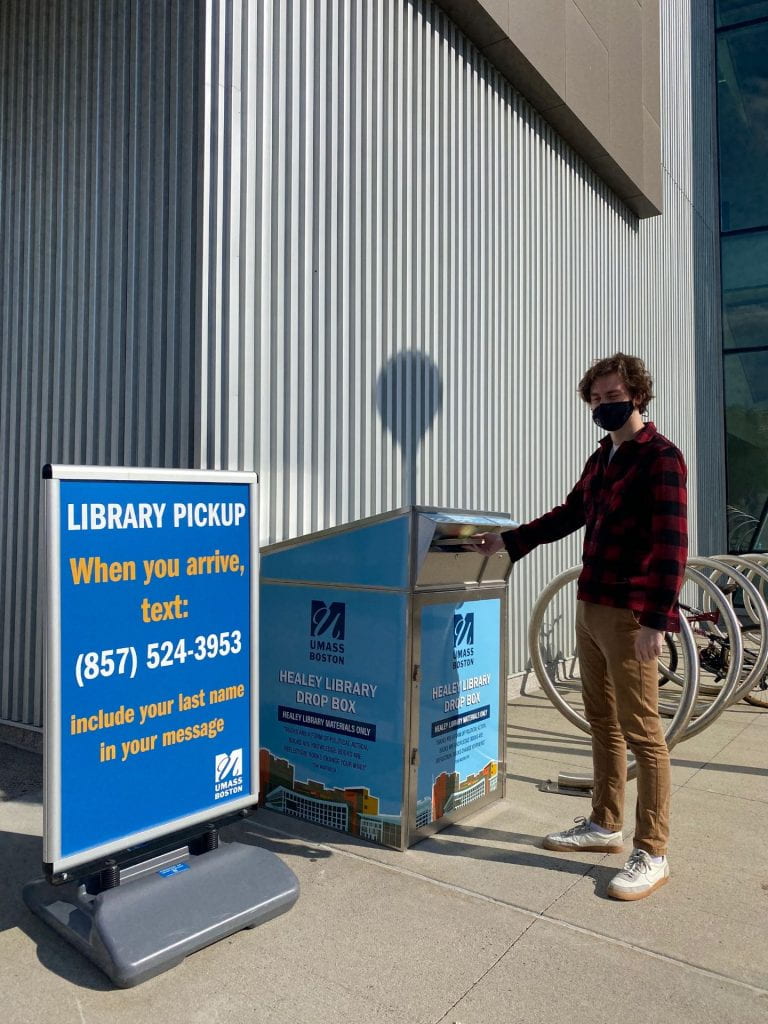
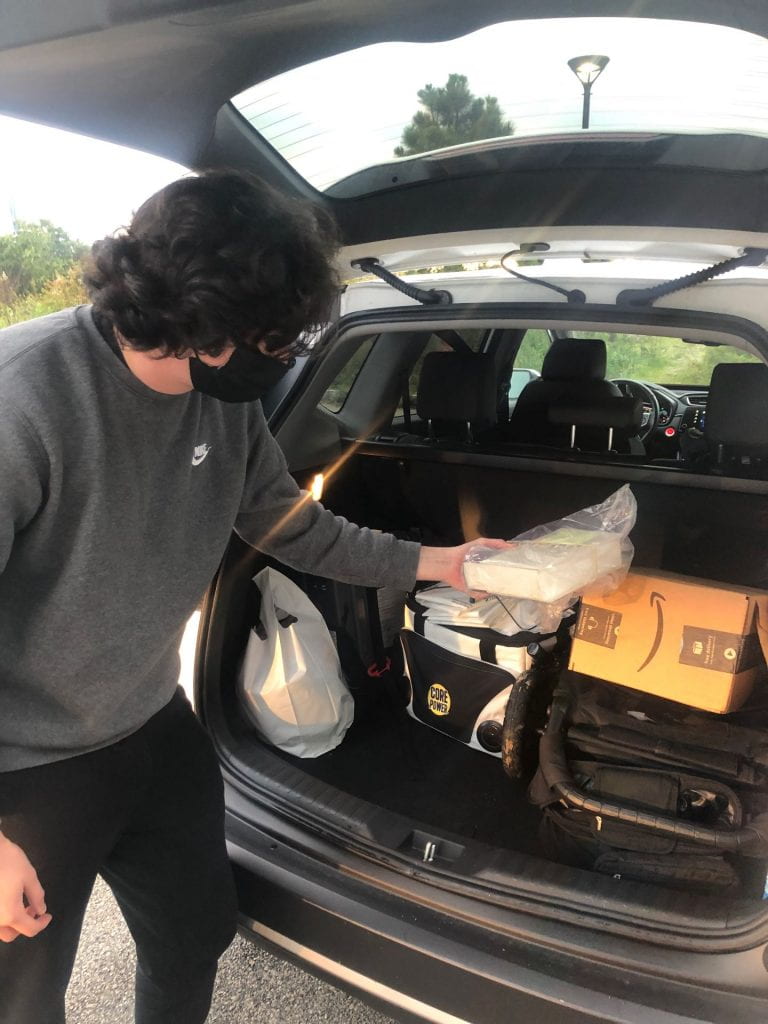
Fall 2021 Curbside Hours
By popular demand, this semester we added evening hours into our curbside pickup offerings. Curbside pickup (in the ISC circle) is now available:
- Thursdays 5:30-8:30pm
- Fridays 10:00am-1:30pm
- Saturdays 10:00am-1:30pm
- (Please note that curbside pickup will not be available during any times that the campus is closed or operating remotely.)
Look for the bright blue wind sign that will direct you to text your last name to (857) 524-3953 when you arrive, and a library staff member will bring your item(s) out to your car.
Outdoor Book Drop Available 24/7
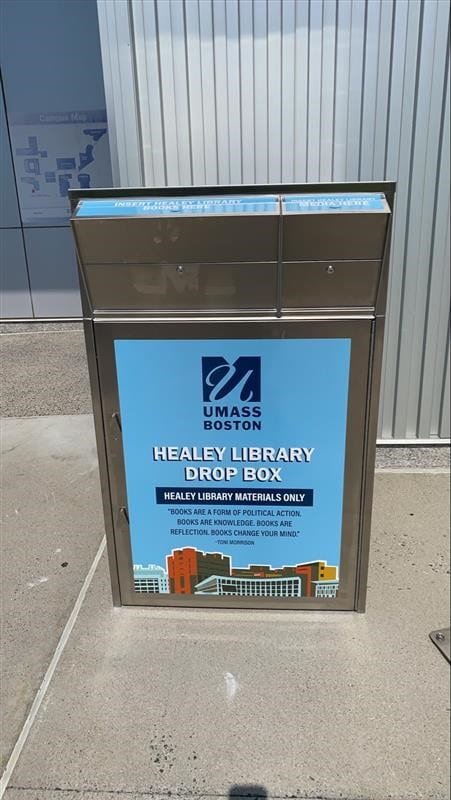
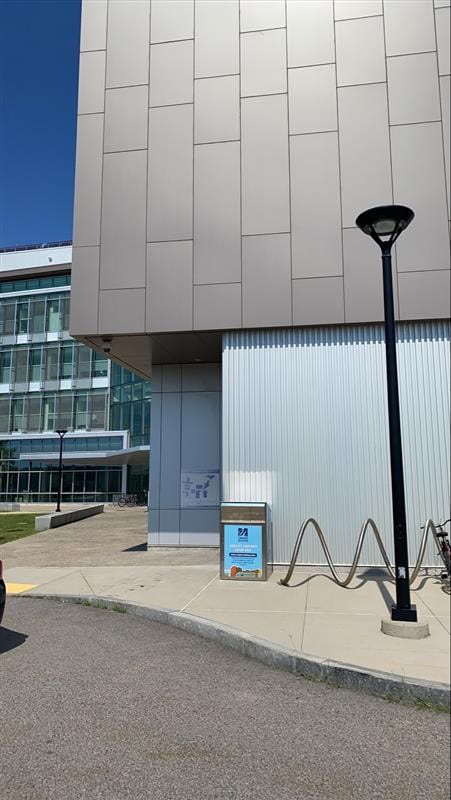 Also new this Fall: a new outdoor book drop available at our curbside location! Returns (of Healey Library/interlibrary loan materials only, please) may be dropped off at any time that’s convenient for you. Please note that these returns will be processed the next day that staff are working on campus, based on the campus schedule for holidays and remote operations. NOTE: Please do NOT return Chromebooks via the drop box; these should continue to be returned in person to the Circulation Desk in Healey Library.
Also new this Fall: a new outdoor book drop available at our curbside location! Returns (of Healey Library/interlibrary loan materials only, please) may be dropped off at any time that’s convenient for you. Please note that these returns will be processed the next day that staff are working on campus, based on the campus schedule for holidays and remote operations. NOTE: Please do NOT return Chromebooks via the drop box; these should continue to be returned in person to the Circulation Desk in Healey Library.
NEW: Healey Library Self-Checkout Machine!
 Healey Library’s new, contactless self-checkout station in the 2nd floor lobby allows you to check out books, renew loaned items, or check your account summary! It’s quick, efficient, and sends receipts directly to your UMass Boston email address. The self-checkout station’s accessibility features include text-to-speech that may be paused, a choice of 60 world languages, and the option to enlarge text and customize button placement. Stop by Healey Library with your BeaconCard and give it a try!
Healey Library’s new, contactless self-checkout station in the 2nd floor lobby allows you to check out books, renew loaned items, or check your account summary! It’s quick, efficient, and sends receipts directly to your UMass Boston email address. The self-checkout station’s accessibility features include text-to-speech that may be paused, a choice of 60 world languages, and the option to enlarge text and customize button placement. Stop by Healey Library with your BeaconCard and give it a try!
Check out the coverage of our ribbon-cutting for the new self-checkout machine in the Mass Media: Healey Library Celebrates Grand Opening of Self-Checkout Station
Healey Library “Zoom Zone”

 If your students ask you about a place to attend a class via Zoom, you can direct them to the “quiet side” of the 6th floor. Follow the signs to the left as you exit the elevators; individual carrels are available for students, and headsets are required to keep the space as peaceful as possible.
If your students ask you about a place to attend a class via Zoom, you can direct them to the “quiet side” of the 6th floor. Follow the signs to the left as you exit the elevators; individual carrels are available for students, and headsets are required to keep the space as peaceful as possible.
Reminders
Submit Your Course Reserves and ILL Requests
Help Healey Library staff plan ahead by submitting your Spring 2022 course reserve requests, and interlibrary loan requests for items you might need over the winter break, as early as possible! Planning ahead will help Healey Library staff work around both shipping delays and any possible periods of campus remote operations.
Lean Library Browser Extension
We’re getting a lot of great feedback from people using the Lean Library browser extension. This browser extension offers a seamless way to access articles that live behind a paywall through Healey Library’s subscriptions. Check out our recent blog post: Want to Make Finding Full Text Articles Easier? Download the Lean Library Browser Extension
Healey Library Requests Form
Thank you for your support and flexibility as we transitioned to a unified system for submitting library requests! Please continue to use this form for library purchase suggestions, course reserve requests, requests for digitization of library/archival materials, and other library-related requests that might pop up. Using this unified requests form allows Healey Library staff to keep track of all requests, route them to the correct departments, monitor their progress, and maintain business continuity in library operations.
New Library Reserves Pilot for Spring 2022
For Spring 2022, Healey Library will be introducing a new Reserves lending program that serves students both on and off campus called Controlled Digital Lending (CDL). The goals are to better serve remote students who need access to course reserves material while also maintaining compliance with copyright law.
Under this new program, at the request of faculty members, Healey Library may digitize a book that we physically own (and is not available as an e-book) and lend out a secured digital version to one user at a time. If you choose to use this pilot program, the physical copy of the Reserves item will be unavailable for checkout. These electronic check-outs cannot be downloaded or printed, and are available for up to 3 hours per lending period.
You can preview pilot CDL texts here: https://digitalreserves.umb.edu/
If you are working with the Ross Center for Disability Services and need an accessible version of a secure electronic reserves item, please have the Ross Center contact us at library.cdl@umb.edu.
We Want Your Feedback!
Scan the code below, or go to: https://forms.gle/pnDnwUVeiTGtqdZt5 to submit any feedback, comments, and suggestions for Healey Library!

Ask Us for Help!
Please don’t hesitate to contact us with your needs. The fabulous Healey Library staff is always ready, willing, and able to help!









